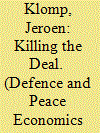| Srl | Item |
| 1 |
ID:
185491


|
|
|
|
|
| Summary/Abstract |
On October 2nd, 2018, Jamal Khashoggi, a journalist and critic of the Saudi Arabian regime, disappeared after a visit to the Saudi Arabian consulate in Turkey nd was most likely murdered shortly afterwards. After this incident, a period of uncertainty started about whether or not a major arms deal that was signed between the United States and Saudi Arabia would still going to be approved by Congress or in turn will be rejected. The main findings presented in this study clearly demonstrate that the uncertainty surrounding the deal caused a significant drop in the daily return on the equity prices of US defense firms. This result suggests that investors believe that it is very likely that the major arms deal will be blocked by Congress in the short-run thereby reducing the business perspectives of the US defense-related industry. Besides these findings also imply that investors expect that the US president will not use its veto power or make permanently use of the exemption clause provided in the US arms trade legislation.
|
|
|
|
|
|
|
|
|
|
|
|
|
|
|
|
| 2 |
ID:
184054


|
|
|
|
|
| Summary/Abstract |
This study examines whether governments use the revenues accruing from agricultural taxes to finance their arms imports. This policy issue is especially of importance for developing countries as the decision to finance the acquisition of arms using agricultural taxes will create a trade-off between two important policy objectives in these countries: on the one hand, ensuring food security for the population at large and, on the other hand, improving national security. Our empirical findings generally suggest that governments in developing countries partly finance their arms imports by increasing the agricultural tax rate. It turns out that the magnitude of this effect relies to a certain extent on country-specific factors such as whether a country has to deal with a security threat, strength of the democratic institutions in place, and the regular occurrence of major shocks to the domestic food provision. Also, taxes on cash crops intended for export are more likely to be used for financing the arms imports compared to taxes on import-competing or subsistence crops.
|
|
|
|
|
|
|
|
|
|
|
|
|
|
|
|